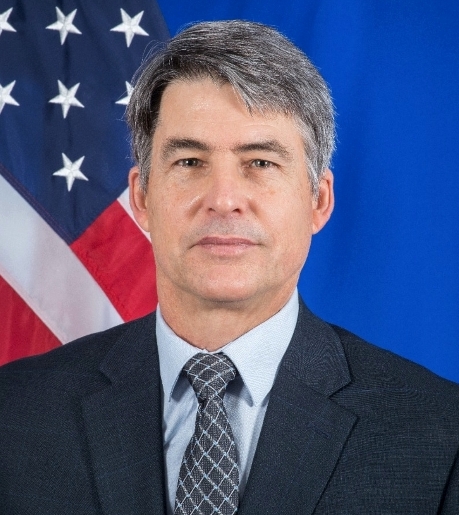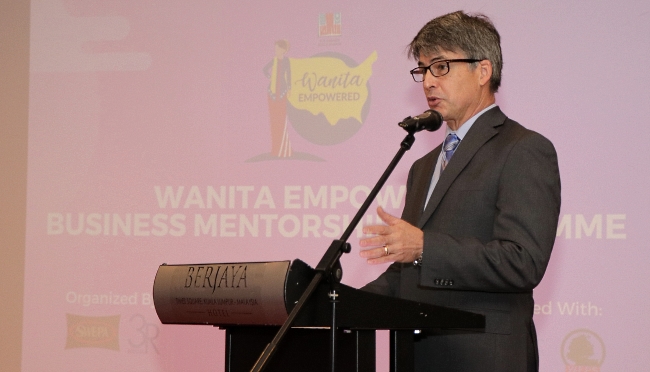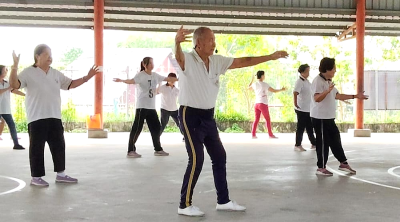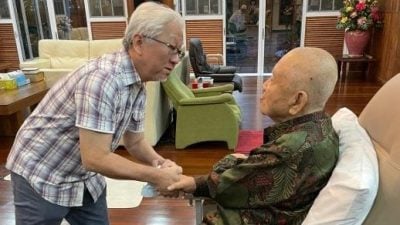By Brian McFeeters

I am excited to be back in Malaysia, especially at this time of opportunity as we are beginning to emerge from the worst darkness of the pandemic to a new period of hope. Difficult times may still lie ahead, but as we begin to rebuild and strengthen our economies and societies, it is important to consider the challenges of the next decade and ensure that we create opportunity. The COVID-19 pandemic has shown that no country can face major global issues alone; but together, we are strong.
Around the world, the United States is engaging with partners to tackle global issues that require a global response. The U.S. is reengaging with the UN Human Rights Council, re-joining the Paris Agreement and the World Health Organization, and leading the world in donations to multilateral COVID-19 relief efforts. As President Biden has said, the United States is focused on partnership, cooperation, and multilateralism to advance diplomacy abroad.
On the bilateral front, the U.S. and Malaysia continue to increase our business ties, our security cooperation, and our people-to-people relationships. As the U.S. Ambassador to Malaysia, I am committed to working with the talented U.S. Embassy team and motivated Malaysians to find new ways to further grow our relationship.
Our business partnership is illustrated by the strength of the U.S. business community here and the deep ties between our economies. U.S. companies have been a part of the Malaysian community for over 100 years. U.S. companies in Malaysia train and employ Malaysians at all levels ranging from fresh college graduates to senior management positions, often in innovative sectors in technology, finance, and creative industries. Most U.S. company subsidiaries are managed by Malaysians, and in most companies over 90 % of their workers are Malaysian.
Our companies are innovating and investing in Malaysia, boosting the development of future technologies like big data and cloud computing, which will enhance the efficiency of future government services under the MyDigital initiative. U.S. collaboration with Malaysian companies in research and manufacturing has also established Malaysia as a key player in the global supply chain for semiconductors, creating more business and job opportunities for Malaysians.
U.S. companies in Malaysia are developing high tech, innovative products and technologies in Malaysia, everything from turbines and jet engines to medical imaging systems and cutting edge cancer treatments.
Moreover, U.S. companies in Malaysia are working together with the Malaysian government and their private sector counterparts to produce critical medical components and ensure global supply chains stay open safely.
Even as COVID-19 upended our lives, I am optimistic of our road to recovery with our shared economic ties.
Our security cooperation is another area of strength and pride for the U.S. and Malaysia. From maritime security to disaster and humanitarian relief efforts, our law enforcement and military officials work together daily to improve the cooperation between our two countries.
Malaysian military officers attend U.S. military service academies and forge lifelong ties with their U.S.-counterparts. The U.S. has also provided ScanEagle Unmanned Aerial System (UAS) aircraft to enhance Malaysia's capability in conducting intelligence and surveillance missions.

Digital security is a priority too. Through the U.S.-ASEAN Smart Cities Partnership, U.S. and Malaysian cybersecurity professionals exchange best practices on protecting smart city infrastructure.
These are ways we have worked together in the past and will continue to work together in the future as we strengthen our security cooperation efforts.
At the same time, we need to continuously invest in our people-to-people relationships. They form the foundation of our connectivity, and lead to peace and prosperity. Americans and Malaysians who have exposure to different ideas, perspectives, and thoughts become more innovative, empathetic, and collaborative.
My first engagement as Ambassador to Malaysia last month was with Young Southeast Asia Leadership Initiative (YSEALI) members from across ASEAN who participated in a workshop on good governance. Over 655 million people live in ASEAN and more than half of them are under the age of 35. Our future will be determined by the successes of the region's young leaders.
We need more programs such as YSEALI and the Youth Exchange Study program. We want to restart the Fulbright English Teaching Assistants program to promote mutual exchange and provide Malaysians with valuable English skills.
The U.S. Embassy has proudly supported expanded relationships between Malaysian and U.S. universities. Nine universities in Malaysia have American Degree Transfer Programs right now, and almost 7,000 Malaysians were studying in the U.S. in 2020. We need even more Americans and Malaysians visiting and studying in both countries.
An outstanding example is Dr. Amani Salim who studied in the U.S. and became the first Malaysian to launch a National Aeronautics and Space Administration (NASA) satellite into space. Upon her return to Malaysia, Dr. Amani spearheaded research that has aided local communities in ensuring clean water supply and monitoring their personal health. We strive to create more U.S.-Malaysian connections like that.
(Brian McFeeters is the United States Ambassador to Malaysia.)
ADVERTISEMENT
ADVERTISEMENT


































